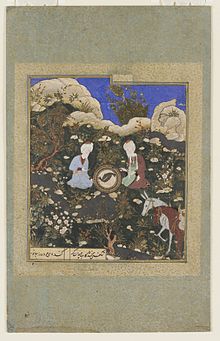Dhū l-Qarnain



Dhū l-Qarnain , Arabic ذو القرنين, DMG Ḏū l-qarnain 'The One with the Two Horns', is a figure that goes back to the Greek Alexander novel and appears at one point in the Koran . “The two-horned man” (interpreted as ruler over East and West) is largely identified with Alexander the Great or the Persian great king Cyrus II , and some also with the Byzantine emperor Herakleios .
Dhū l-Qarnain occurs in the Koran in sura 18 verses 83-98, where he is against the kings Gog and Magog , who lead a barbaric end-time people - in the Koran Ya'judj and Ma'judj /يأجوج ومأجوج / Yaʾǧūǧ wa-Maʾǧūǧ - fought in the far west of the earth, where the sun set in a "muddy spring", defeating the kings by building an iron wall covered with copper.
Dhū l-Qarnain is regarded as a devout Muslim because he spoke to the peoples of the West about the punishment of God the wicked and his goodness towards the orthodox; However, there is disagreement as to whether “the horned one” was also viewed as a prophet .
Text excerpt from the Koran in translation
“And they ask you about the one with the two horns. Say: I'll read you a story about him.
We had given him power on earth and given him a way to everything.
Then he took a path.
When he finally got to the place where the sun sets, he found that it sets in a muddy spring. And he found a people with her. We said: 'You with the two horns! Either you punish or you show kindness to them. '
He said, 'If someone does wrong, we will punish them. After that (that is, on the last day) he will be brought before his Lord, who will punish him (in turn) horribly.
But if someone believes and does what is right, he (one day) has to expect the best as a reward. And we will (?) Speak to him in a friendly manner (?) '
Then he took a (different) path.
When he finally got to the place where the sun rises, he found that it rises over people whom we have not given shelter from.
That's how it went). And we know (well) about how it was with him.
Then he (again) took a (different) path.
When he finally got to the place between the two walls, he found (on this side) of them people who, if you said something to them, hardly understood it.
They said: 'You with the two horns! Gog and Magog are wreaking havoc on earth. Shall we not charge you a fee for building a wall between us and them? '
He said, 'The power my Lord has given me is better (than what you can offer me). Help me now so that I can build a protective wall between you and them!
Bring me the pieces of iron! ' When he finally made (the wall) evenly high between the two mountain slopes, he said: 'Blast (on the fire)!' When he finally got it to glow, he said, 'Bring me (liquid) metal to pour over!'
Now they could not get over it (ie the protective wall) and not break through it.
He said, 'This is (a show of) mercy from my Lord. But when (one day) the promise (or: the threat) of my Lord is fulfilled, he will turn him to dust. And the promise (or: the threat) of my Lord is true. '"
Individual evidence
- ↑ Sura 18: 83-98; 18: 60-64 also go back to the Alexander novel; see. z. B. Rudi Paret : The Koran , Commentary and Concordance; Kohlhammer, Stuttgart 7. A. 2005, ISBN 3-17-018990-5 , 318f (lit.).
- ^ Peter Lamborn Wilson , Karl Schlamminger: Weaver of Tales. Persian Picture Rugs / Persian tapestries. Linked myths. Callwey, Munich 1980, ISBN 3-7667-0532-6 , pp. 79-139 ( The Kings ), here: pp. 84-86 ( Alexander ).
- ^ William Montgomery Watt : Art. Al-Iskandar , in: Encyclopaedia of Islam 2. A., Vol. 4 (1997), 127.
- ^ V. Popp, K.-H. Ohlig : Early Islam. A historical-critical reconstruction based on contemporary sources. Schiler Verlag, 2nd edition. 2010. p. 36 ff.
- ^ Gotthard Strohmaier : Avicenna. Beck, Munich 1999, ISBN 3-406-41946-1 , p. 65 (on the “muddy source” of the matter).
- ^ Watt 1997.
